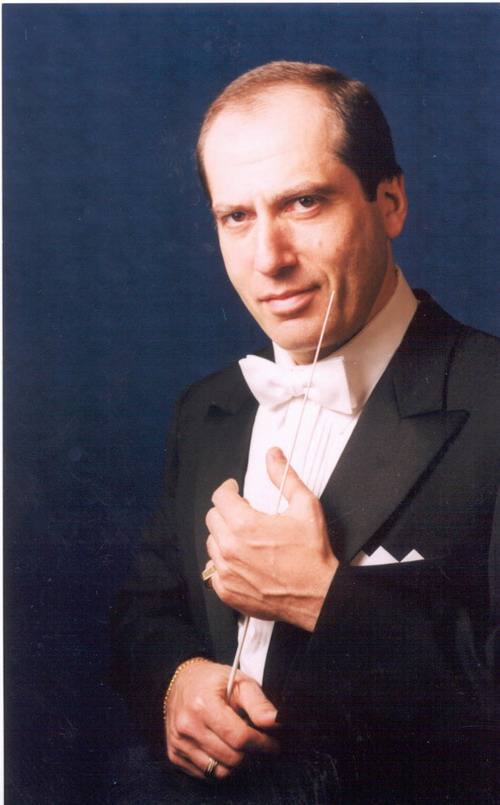

点击此处查看全部娱乐图片
帕维尔·柯冈现任莫斯科国立交响乐团音乐总监、首席指挥。1952年出生在俄罗斯一个由众多音乐大师组成的音乐世家。帕维尔·柯冈12岁首次登台,引起了音乐界的轰动,那是一场由音乐爱好者组织的音乐会,他的父亲——20世纪最伟大的小提琴演奏家之一莱昂尼德·柯冈、他的母亲——前苏联著名钢琴家艾丽查维塔·吉利尔斯和他一起表演“家庭三重奏”。顺便提及他的舅舅是埃米尔·吉利尔斯――中国的乐迷非常喜欢的钢琴家。从音乐学校毕业后,帕维尔·柯冈又继续在音乐学校攻读了小提琴演奏和指挥两个专业,由此得以深入
地探索不同门类艺术之间彼此的联系。在音乐学院,柯冈幸运地拜在莫斯科国立交响乐团的创始人之一——里奥·金茨伯格的门下学习,从而为他日后的发展打下坚实的基础。
1970年,18岁的柯冈凭借优异的小提琴演奏天赋,获得了西贝柳斯国际小提琴比赛的一等奖,此后,他便频繁地与来自俄罗斯、欧洲、美国以及亚洲的交响乐团合作,包括世界著名的费城交响乐团和洛杉矶爱乐乐团。
柯冈在小提琴演奏上所取得的非凡成就,为其投身指挥艺术奠定了重要基础。他认为弦乐器是管弦乐队中的基石,是乐队音响的核心。帕维尔·柯冈第一次以指挥的身份站在舞台上时还不到19岁。1974年,他第一次执棒就是指挥前苏联最顶尖的乐团——列宁格勒(圣彼得堡)爱乐乐团演出。在随后的几年里,帕维尔·柯冈又陆续指挥苏联国立交响乐团、苏联广播电视国立交响乐团、列宁格勒爱乐乐团、莫斯科爱乐乐团和莫斯科大剧院交响乐团,以及来自欧洲、美洲和日本的顶尖交响乐团。柯冈还经常以客座指挥家的身份参加在赫尔辛基、蒙特利尔和布拉格等地举办的音乐节。1988年,帕维尔·柯冈接到了南斯拉夫萨格勒布爱乐乐团的邀请,出任该乐团的音乐总监与首席指挥。
帕维尔·柯冈一向十分重视本国的交响乐团。1989年,莫斯科国立交响乐团团员全票表决通过,帕维尔·柯冈二度走马上任。帕维尔·柯冈凭籍音乐方面的天资以及在弦乐演奏方面渊博的知识,促使乐团在保持优秀传统的同时不断创新。通过上演一系列西方作曲家的作品,使乐团取得了长足的进步。贝多芬、门德尔松、勃拉姆斯、舒曼、布鲁克纳、柴可夫斯基、拉赫玛尼诺夫、肖斯塔科维奇以及马勒等作曲家的全套交响乐是乐团世界巡演的保留曲目。1977年,柯冈因上演马勒交响曲全集及声乐作品而获得“苏联国家津贴”,同年成为“俄罗斯艺术研究会”会员。作为指挥他与尤里·巴什米特、斯塔克、雷宾、温格洛夫等很多国际知名的独奏家合作演出音乐会。
1998年帕维尔·柯冈出任美国犹他州交响乐团的首席客座指挥。在演奏之余,帕维尔·柯冈致力于投身音乐教育事业。
Pavel Kogan
Music Director and Chief Conductor of Moscow State Symphony Orchestra
As to Pavel Kogan’s biography as an artist, he was blessed with brilliant teachers all his life. Pavel Kogan was born in 1952. At the age of 12 he made his debut in a philharmonic concert as part of the family trio. He performed together with his father—one of the most outstanding violinist of the 20th century — Leonid Kogan, and mother, Elizaveta Gilels. And his uncle is world famous pianist Emil Gilels. The young graduate of a music school continued his education at the conservatoire majoring in two classes at the same time – as a violinist and symphony conductor. The young talent simply felt the inseparable connection between these musical arts. Fate had it that Kogan’s teacher in conducting class was Leo Ginzburg, one of the founding fathers of the Moscow State Symphony Orchestra.
In 1970, when Pavel Kogan was 18, his talent as a violinist received the highest grades at the Sibelius International Violin Competition. This success was followed by numerous concerts with the leading orchestras of Russia, Europe, Japan and the United States, including the Philadelphia Orchestra and Los Angeles Philharmonic Orchestra.
The brilliant career of a violinist became an excellent basis for his work as a conductor. Like no other, he understood that the strings were the foundation of a symphony orchestra and the core of its sound.
Although Pavel Kogan first rose to the conductor’s stand when he was not yet 19, his debut as a symphony conductor took place in 1974 with the Leningrad (now St. Petersburg) Philharmonic Orchestra, a leading orchestra of the Russian Federation. In the years that followed, the conductor Pavel Kogan performed with the best orchestras of Europe, America and Japan. Among those, the Russian orchestras make up a so-called Hall of Fame of Russian culture – the USSR State Symphony Orchestra, the State Symphony Orchestra of the USSR Radio and Television, the Leningrad Philharmonic Orchestra, the Moscow Philharmonic Orchestra, and the Bolshoi Theater Symphony Orchestra. The maestro became a welcome guest at symphony music festivals in Helsinki, Dubrovnik, Montreux, Prague and Villach.
In 1988 Pavel Kogan got an invitation from the Zagreb Philharmonic Orchestra. He became the Music Director and Chief Conductor of that orchestra. During the time he worked with the orchestra and performed all over the world, he was also giving concerts in his country as well: Moscow, Leningrad, Sverdlovsk, Kiev, the Baltic capital cities…
In May 1989 Pavel Kogan became the head of the Moscow State Symphony Orchestra. The fact that this was in his own country was very important to Kogan. He took over the orchestra, and the orchestra chose him in the unanimous choice.
Pavel Kogan’s ability to work hard, to achieve his goals, his talent as a musician and his perfect knowledge of the nature of string instruments allows him to constantly improve the creative and repertoire policy of the orchestra. A major step forward for MSSO was the decision to include works by Western classics in its programs, which, in Pavel Kogan’s opinion, foster discipline and determination in a creative team. A hallmark of Kogan’s orchestra, as MSSO is referred to all over the world, is its large-scale series, or cycles: all symphony works of Beethoven, Mendelssohn, Brahms, Schumann, Schubert, Bruckner, Sibelius, Tchaikovsky, Rakhmaninov, Prokofiev and Shostakovich; all Mahler symphonies and vocal cycles. For Pavel Kogan a pause in the acquisition of new repertoire is a big sin, while the acquisition itself is not only the accumulation of new material but also its creative interpretation and renewal of his own visions and renditions. In 1977 Pavel Kogan received the National Prize of the Russian Federation for the performance of the full cycle of all Gustav Mahler’s Symphonies and the Vocal Cycles. That same year he became a full member of the Russian Academy of Arts.
As a conductor, Pavel Kogan’s worked together with many soloists, among them are Yu. Bashmet, V. Tretyakov, Y. Shtarker, V. Repin, M. Vengerov and many other excellent musicians.
In 1998 Pavel Kogan became the Principal Guest Conductor of the Utah Symphony Orchestra in Salt Lake City. Now the chief conductor Pavel Kogan had been involved in extensive educational work. His orchestra is the leader in sales of subscriptions and tickets to concerts of the Moscow Philharmonic Society.
|